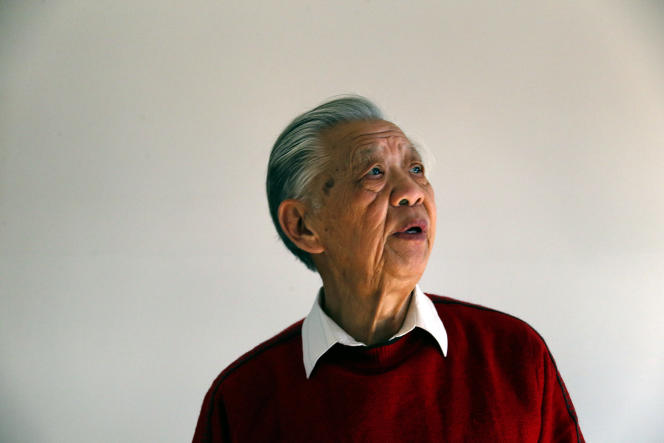He was presented as “the conscience of Chinese lawyers”, Zhang Sizhi, defender of the indefensible, tutelary figure of human rights lawyers in China, died Friday, June 24, at the age of 94, in Beijing. He rose to prominence in the 1980s during the trial of the “Gang of Four”, when he was chosen to defend Mao Zedong’s widow, Jiang Qing, accused of the worst crimes of the Cultural Revolution. Cautious but determined, he had enjoyed an exceptional longevity, managing to avoid the prison sentences suffered by many of his younger colleagues. He remained active until a stroke in 2014. France awarded him the Legion of Honor in 2016.
Born November 12, 1927 in Henan Province, central China, Zhang Sizhi practiced first as a judge and then as one of the few lawyers in the young People’s Republic of China, established after the Communist victory in China. 1949. Coming from a family of doctors, he was considered a “right-hander” during the Hundred Flowers campaign, and sent to a labor re-education camp in 1957. He spent fifteen years there, on the outskirts of Beijing. He could not resume his activity until 1979, three years after the death of the despot Mao Zedong, and while his clique, which had ruled the country during the Cultural Revolution (1966-1976), was about to be tried.
A tight argument
During these highly political trials, between 1980 and 1981, Zhang Sizhi, who had become a high school teacher after leaving the camps, was recalled by the authorities. He is appointed to represent Jiang Qing, the widow of Mao, who dismisses him to defend himself alone. “She was hated, but he had the idea that everyone has the right to be defended, including someone monstrous”, explains Judith Bout who spoke with him at length from the 2000s to write Les Confessions of Master Zhang (ed. François Bourin, 2013). He finally ensures the defense of another member of this clique, Li Zuopeng, former general and close to Lin Biao. If he has no illusions about the outcome of a political trial, Zhang Sizhi obtains, thanks to a tight argument, the lifting of half of the charges against his client.
Other cases bolster Zhang Sizhi’s reputation: in 1988, he defended the innocence of a forest ranger held responsible for a deadly fire. In 2005, aged 78, he posthumously obtained the rehabilitation of a man unjustly sentenced to death for murder ten years earlier. He’s also not shy about grabbing political cases that his colleagues shy away from: a sociologist accused of supporting the 1989 Tiananmen protests, or officials like Bao Tong, Zhao Ziyang’s secretary, general secretary. of the Communist Party, purged in 1989 because he refused to use strong force against the Tiananmen students. Cases that the Chinese media were careful not to mention when they reported his death this week.
“He made the profession of lawyer exist where there was none: after 1956, there were no more legal trials, only political trials, without a lawyer, and even without the right to defend oneself for the defendants,” explains his biographer Judith Bout. From the end of the 1980s, Zhang Sizhi passed on his knowledge to a young generation of jurists and naturally became the mentor of a “rights defense movement” that emerged in the 2000s. A parenthesis gradually closed from 2008 , when arrests of human rights defenders and lawyers increase.
In 2014, closely watched and banned from teaching, Zhang Sizhi embarked on a final battle to defend Pu Zhiqiang, lawyer for artist Ai Weiwei, arrested for “causing trouble”. “He could not stand the pressure he was under around this trial,” said Judith Bout: in September 2014, Zhang suffered a cerebral thrombosis, and lost the use of speech. “He had a schoolboy humor, with a lot of puns, which he was kind enough to explain to me. It remained with him until the end of his life: when he could no longer speak, he mimed,” recalls Judith Bout.

















